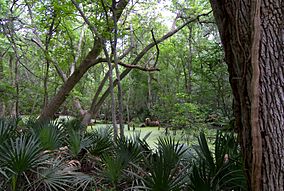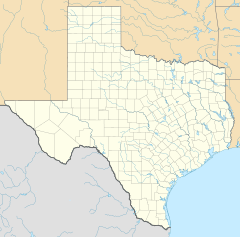Palmetto State Park facts for kids
Quick facts for kids Palmetto State Park |
|
|---|---|

One of the bogs of the park surrounded by the namesake palmettos.
|
|
| Location | Gonzales County, Texas |
| Nearest city | Luling |
| Area | 270.3 acres (109 ha) |
| Established | 1936 |
| Governing body | Texas Parks and Wildlife Department |
Palmetto State Park is a cool state park found in Gonzales County, Texas, in the United States. It's located between the towns of Gonzales and Luling. This special park opened its doors in 1936 after the land was bought from private owners and the City of Gonzales.
Contents
What Makes Palmetto State Park Special?
This park gets its name from the dwarf palmetto (Sabal minor), a small palm tree that grows everywhere here. Imagine walking through an area filled with these unique plants!
The beautiful San Marcos River flows right through the park, adding to its natural charm. You'll also find a 4-acre (1.6 ha) lake called Oxbow Lake. It was first formed by floodwaters but now gets its water from underground springs.
One of the most exciting parts of the park are its many bogs. These are wet, marshy areas surrounded by thick plants. They make the park feel a bit like a jungle!
How the Park Was Built
Did you know that much of Palmetto State Park was built by a group called the Civilian Conservation Corps (CCC)? This was a program during the 1930s that helped young men find work during tough economic times.
Between 1934 and 1937, CCC Companies 873 and 886 worked hard here. They built important things like Park Road 11, a special low-water crossing on the San Marcos River, and a water tower. They also constructed buildings like the refectory (a dining hall) and the park headquarters. Plus, they made picnic areas, rock pools, and even concrete picnic tables for visitors to enjoy!
Plants You Can Find in the Park
Besides the famous dwarf palmetto, Palmetto State Park is home to many other interesting plants. You might spot the bright red flowers of the red buckeye tree.
Another plant you'll see is the rattan vine. This vine can grow very long and twist around other plants, adding to the park's wild, natural feel.
Animals You Might See at Palmetto State Park
The park is a great place for wildlife! Many animals call Palmetto State Park home.
Mammals
You'll often see White-tailed deer roaming freely. Other common mammals include clever raccoons, unique nine-banded armadillos, and busy fox squirrels. Keep your eyes peeled for these furry friends!
Birds
Birdwatchers love Palmetto State Park because over 240 different kinds of birds have been seen here! Some of the cool birds you might spot include the large pileated woodpecker with its red crest, and the colorful Kentucky warbler.
You might also hear or see the bright yellow prothonotary warbler near the water. Look up to the sky for the majestic red-shouldered hawk soaring overhead.
 | Charles R. Drew |
 | Benjamin Banneker |
 | Jane C. Wright |
 | Roger Arliner Young |


